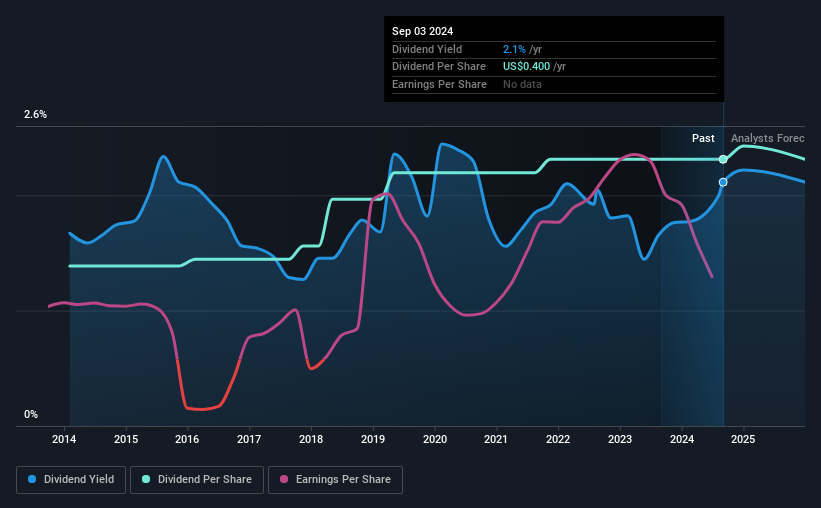Vishay Intertechnology (NYSE:VSH) Will Pay A Dividend Of $0.10
Vishay Intertechnology, Inc. (NYSE:VSH) will pay a dividend of $0.10 on the 26th of September. Based on this payment, the dividend yield on the company's stock will be 2.1%, which is an attractive boost to shareholder returns.
Check out our latest analysis for Vishay Intertechnology
Vishay Intertechnology's Payment Has Solid Earnings Coverage
A big dividend yield for a few years doesn't mean much if it can't be sustained. Vishay Intertechnology is quite easily earning enough to cover the dividend, however it is being let down by weak cash flows. With the company not bringing in any cash, paying out to shareholders is bound to become difficult at some point.
The next year is set to see EPS grow by 20.1%. Assuming the dividend continues along recent trends, we think the payout ratio could be 29% by next year, which is in a pretty sustainable range.

Vishay Intertechnology Has A Solid Track Record
The company has an extended history of paying stable dividends. The dividend has gone from an annual total of $0.24 in 2014 to the most recent total annual payment of $0.40. This implies that the company grew its distributions at a yearly rate of about 5.2% over that duration. The dividend has been growing very nicely for a number of years, and has given its shareholders some nice income in their portfolios.
Dividend Growth Is Doubtful
Investors could be attracted to the stock based on the quality of its payment history. However, initial appearances might be deceiving. Vishay Intertechnology has seen earnings per share falling at 9.6% per year over the last five years. If earnings continue declining, the company may have to make the difficult choice of reducing the dividend or even stopping it completely - the opposite of dividend growth. It's not all bad news though, as the earnings are predicted to rise over the next 12 months - we would just be a bit cautious until this can turn into a longer term trend.
Our Thoughts On Vishay Intertechnology's Dividend
Overall, we don't think this company makes a great dividend stock, even though the dividend wasn't cut this year. While the low payout ratio is a redeeming feature, this is offset by the minimal cash to cover the payments. We would probably look elsewhere for an income investment.
Companies possessing a stable dividend policy will likely enjoy greater investor interest than those suffering from a more inconsistent approach. Meanwhile, despite the importance of dividend payments, they are not the only factors our readers should know when assessing a company. As an example, we've identified 3 warning signs for Vishay Intertechnology that you should be aware of before investing. If you are a dividend investor, you might also want to look at our curated list of high yield dividend stocks.
Mobile Infrastructure for Defense and Disaster
The next wave in robotics isn't humanoid. Its fully autonomous towers delivering 5G, ISR, and radar in under 30 minutes, anywhere.
Get the investor briefing before the next round of contracts
Sponsored On Behalf of CiTechNew: Manage All Your Stock Portfolios in One Place
We've created the ultimate portfolio companion for stock investors, and it's free.
• Connect an unlimited number of Portfolios and see your total in one currency
• Be alerted to new Warning Signs or Risks via email or mobile
• Track the Fair Value of your stocks
Have feedback on this article? Concerned about the content? Get in touch with us directly. Alternatively, email editorial-team (at) simplywallst.com.
This article by Simply Wall St is general in nature. We provide commentary based on historical data and analyst forecasts only using an unbiased methodology and our articles are not intended to be financial advice. It does not constitute a recommendation to buy or sell any stock, and does not take account of your objectives, or your financial situation. We aim to bring you long-term focused analysis driven by fundamental data. Note that our analysis may not factor in the latest price-sensitive company announcements or qualitative material. Simply Wall St has no position in any stocks mentioned.
About NYSE:VSH
Vishay Intertechnology
Manufactures and sells discrete semiconductors and passive electronic components in the United States, Germany, rest of Europe, Israel, and Asia.
Fair value with moderate growth potential.
Similar Companies
Market Insights
Weekly Picks

Early mover in a fast growing industry. Likely to experience share price volatility as they scale


A case for CA$31.80 (undiluted), aka 8,616% upside from CA$0.37 (an 86 bagger!).


Moderation and Stabilisation: HOLD: Fair Price based on a 4-year Cycle is $12.08
Recently Updated Narratives

Airbnb Stock: Platform Growth in a World of Saturation and Scrutiny

Clarivate Stock: When Data Becomes the Backbone of Innovation and Law

Adobe Stock: AI-Fueled ARR Growth Pushes Guidance Higher, But Cost Pressures Loom
Popular Narratives


Crazy Undervalued 42 Baggers Silver Play (Active & Running Mine)


NVDA: Expanding AI Demand Will Drive Major Data Center Investments Through 2026


MicroVision will explode future revenue by 380.37% with a vision towards success
Trending Discussion


